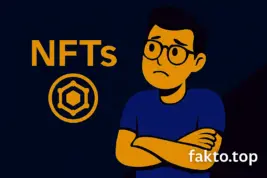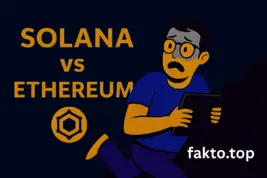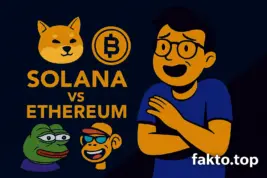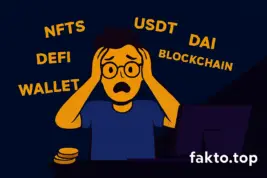Crypto Explained Simply: Understand the Tech, Trends, and Tools
Cryptocurrency isn’t just about price charts or hype cycles. It’s a shift in how people think about money, ownership, and trust. fakto.top exists to help you navigate that shift — whether you’re new to crypto or already exploring DeFi, NFTs, and trading strategies. This page is your starting point: a clear, grounded overview of what crypto is, how it works, and why it matters. No fluff, no jargon overload — just practical knowledge, explained in plain English.

What Powers Cryptocurrency?
At its foundation, cryptocurrency is digital value secured by cryptography and distributed across a network. Unlike traditional currencies, it’s not issued by a central bank or tied to a government. Instead, it operates on decentralized protocols that allow users to send, receive, and store assets without intermediaries.
Bitcoin, for example, uses a proof-of-work system where miners validate transactions and secure the network. Ethereum, on the other hand, has transitioned to proof-of-stake, which relies on validators who lock up coins to participate in consensus. These systems are designed to prevent fraud, ensure transparency, and maintain trust — all without a central authority.
If you’re just starting out, our guide on crypto for beginners breaks down the key concepts in a way that’s easy to follow, even if you’ve never touched a wallet or exchange before.
The Technology Behind Cryptocurrency
Crypto isn’t magic — it’s math, code, and distributed systems. The backbone of most cryptocurrencies is blockchain: a digital ledger that records transactions in blocks, which are linked together chronologically. Once a block is added, it can’t be changed, making the system tamper-resistant and transparent.
Beyond blockchain, there are smart contracts — self-executing pieces of code that run on platforms like Ethereum. These contracts allow developers to build decentralized applications (dApps) that operate without middlemen. Think lending platforms, NFT marketplaces, or automated trading bots — all powered by code.
To understand how these technologies interact, check out our explainer on how cryptocurrency works. It covers the technical stack in plain terms, without assuming prior knowledge.

Blockchain: The Core Infrastructure
Imagine a shared notebook that anyone can write in, but no one can erase. That’s blockchain. Every transaction is recorded publicly, and once confirmed, it becomes part of the permanent record. This structure makes fraud difficult and accountability easy.
Blockchains can be public (like Bitcoin and Ethereum) or private (used by companies for internal data). Public chains are permissionless — anyone can join, validate, and transact. Private chains are more controlled, often used for enterprise solutions.
For those interested in trading, understanding blockchain mechanics is essential. Our guide on learning crypto trading from scratch includes practical insights on how blockchain affects liquidity, speed, and security.
Why Learn the Fundamentals?
Crypto moves fast. New coins launch daily, regulations shift, and platforms evolve. Without a solid foundation, it’s easy to get lost — or worse, scammed. Learning the basics helps you spot red flags, evaluate projects, and make informed decisions.
It’s not just about investing. Crypto is changing how people earn, save, and interact online. From decentralized finance to digital identity, the implications go far beyond trading. That’s why fakto.top focuses on education first — hype comes second.
how to earn crypto in 2025 outlines beginner-friendly strategies that don’t require technical expertise.
Let’s simplify. Crypto is digital money. You can send it, receive it, store it, and trade it — all online. But unlike dollars or euros, crypto isn’t printed or controlled by a central bank. It’s created through algorithms and maintained by decentralized networks.
To use crypto, you’ll need a wallet — a tool that stores your private keys and lets you interact with the blockchain. There are hot wallets (connected to the internet) and cold wallets (offline and more secure). Exchanges let you buy and sell coins, while dApps offer services like lending, staking, and swapping.
Choosing the right wallet is key. Our page on best crypto wallets compares options for U.S. users, including mobile apps, browser extensions, and hardware devices.
Theoretical Foundations of Crypto
Crypto isn’t just a technical innovation — it’s a philosophical one. It challenges the idea that financial systems must be centralized, regulated, and opaque. Instead, it promotes transparency, autonomy, and peer-to-peer interaction.
Bitcoin was born out of the 2008 financial crisis, as a response to bank bailouts and monetary manipulation. Its creator, Satoshi Nakamoto, envisioned a system where users could control their own money, without relying on institutions.
This ethos continues today in projects that prioritize privacy, censorship resistance, and open access. If you’re exploring decentralized finance, our guide on earning crypto with DeFi tools shows how these principles translate into real-world applications.

Wallets and Privacy
Not all wallets are created equal. Some require identity verification (KYC), while others let you transact anonymously. If privacy is a priority, consider tools that don’t collect personal data. Our list of crypto wallets without KYC includes options that balance usability with discretion.
For users in the TON ecosystem, the Tonkeeper wallet offers a streamlined experience tailored to Telegram-native assets. It’s lightweight, secure, and built for mobile-first interaction.
Trading vs. Holding
Some users trade daily, chasing short-term gains. Others hold assets for years, betting on long-term growth. Both approaches have merit — but they require different mindsets. Trading demands attention, speed, and risk management. Holding requires patience and conviction.
If you’re new to trading, our guide on how to trade Bitcoin for beginners covers the basics: order types, market psychology, and common pitfalls.
NFTs: Ownership in the Digital Age
Non-Fungible Tokens (NFTs) are digital assets that represent ownership of unique items — art, music, game items, even real-world documents. Unlike cryptocurrencies, which are interchangeable, NFTs are one-of-a-kind. Each token is tied to metadata and stored on a blockchain, making it verifiable and tradable. 
But NFTs aren’t just collectibles. They’re being used for ticketing, identity, and brand loyalty. Some companies issue NFTs as part of customer rewards programs, giving users access to exclusive content or discounts. If you’re curious how this works in practice, our guide on NFT loyalty programs explores real-world use cases and adoption trends.
For beginners, the NFT space can feel chaotic — overpriced JPEGs, celebrity drops, and confusing marketplaces. That’s why we built a clear, jargon-free NFT guide to help you understand what’s hype, what’s real, and how to participate safely.
Pop Culture Meets Blockchain
Crypto isn’t isolated from culture — it’s becoming part of it. Projects like Pokémon NFT cards blend nostalgia with blockchain tech, creating digital collectibles that resonate with fans. These aren’t just speculative assets; they’re cultural artifacts with emotional value.
Other projects push boundaries in storytelling and design. Square Mice NFTs, for example, use minimalist visuals and layered lore to build community engagement. If you’re exploring how narrative and design shape NFT ecosystems, our page on why Square Mice NFTs matter now breaks it down.
Solana vs. Ethereum: A Real Debate
Ethereum has long been the dominant smart contract platform, but Solana is gaining ground. With faster transaction speeds and lower fees, Solana appeals to developers building scalable apps. It’s especially popular in NFT and gaming circles, where speed matters. 
That said, Ethereum’s ecosystem is massive. It has more dApps, more developers, and more integrations. The question isn’t whether Solana will replace Ethereum — it’s whether it can carve out a distinct niche. Our analysis of Sol vs ETH in 2025 compares performance, adoption, and developer sentiment across both chains.
Meme Coins: Volatility with a Side of Humor
Meme coins like Dogecoin, Shiba Inu, and Pepe started as jokes — but some gained serious traction. Their value often comes from community engagement, viral marketing, and speculative trading. They’re unpredictable, but they also reflect crypto’s playful side.
Pepe, for instance, exploded in popularity due to its meme heritage and low entry price. Traders jumped in, hoping for quick gains. But meme coins are risky — they can pump hard and crash just as fast. If you’re tracking trends, our breakdown of Pepe crypto shows how sentiment drives price action. 
Looking Ahead: The 2025 Bull Run
Crypto markets move in cycles. After periods of consolidation, they often enter bull phases — rapid growth, increased adoption, and rising prices. Many analysts expect the next major bull run in 2025, driven by macroeconomic shifts, regulatory clarity, and institutional interest.
But bull runs aren’t just about price. They bring new users, new projects, and new risks. Scams increase, hype dominates, and volatility spikes. That’s why preparation matters. Our forecast for the crypto bull run 2025 outlines key indicators, sectors to watch, and how to stay grounded when the market heats up.
Building a Learning Path
Crypto education works best when it’s layered. You start with basic concepts — what is Bitcoin, how wallets work — then move to trading, DeFi, and NFTs. Each step builds on the last, creating a foundation that’s both flexible and resilient.

That’s how fakto.top is structured. Our content isn’t random — it’s designed as a funnel. You begin with crypto for beginners, then move to how cryptocurrency works, and eventually explore trading from scratch. Each guide links forward and backward, helping you learn without getting overwhelmed.
Emotions and Decision-Making
Crypto isn’t just technical — it’s emotional. Fear, greed, and FOMO drive markets as much as fundamentals. That’s why emotional discipline is crucial. Learn to zoom out, stick to your plan, and avoid impulsive decisions.
Some users prefer passive strategies — staking, earning yield, or building side income. These approaches reduce stress and offer steady returns. Our page on crypto side hustles explores low-risk ways to earn without constant market watching.
Legal Safety and U.S. Compliance
For U.S. users, crypto comes with legal responsibilities. From KYC requirements to tax reporting, compliance matters. Using platforms that follow U.S. regulations helps avoid penalties and protects your assets.

fakto.top is built with legal safety in mind. We avoid risky phrasing, follow FTC guidelines, and structure content to be SEC-conscious. If you’re exploring decentralized finance, our guide on earning crypto with DeFi tools explains how to stay compliant while participating in open finance.
Community and Culture
Crypto is more than tech — it’s people. Telegram groups, Discord servers, Twitter threads — these are where ideas form, projects launch, and trends emerge. A strong community can make or break a coin.
That’s why fakto.top focuses on clarity and trust. We don’t chase hype — we build understanding. Whether you’re into NFTs, trading, or passive income, you’ll find content that respects your time and intelligence.
Crypto Is Global — So Is the Conversation
While regulations vary from country to country, the core principles of crypto remain universal: decentralization, transparency, and user empowerment. Whether you’re in London, Lagos, Sydney, or Singapore, the tools and technologies are largely the same. What changes is how governments respond, how communities form, and how adoption unfolds.
That’s why fakto.top speaks to a global audience. Our content is written in clear, accessible English, designed to help anyone — regardless of location — understand the crypto landscape. We avoid region-specific assumptions and focus on the fundamentals that apply everywhere.

Crypto Isn’t Just Finance — It’s Infrastructure
Beyond coins and tokens, crypto is building a new layer of the internet. Decentralized identity, peer-to-peer storage, permissionless communication — these are the building blocks of Web3. It’s not just about making money; it’s about rethinking how we interact online.
Wallets become login credentials. Tokens become access keys. Smart contracts replace bureaucratic processes. This shift is already underway, and it’s not limited to any one country or market. If you’re exploring how to get started, our guide on crypto basics explained lays out the foundational tools and concepts.
What fakto.top Offers
This site isn’t a news aggregator or a hype machine. It’s a learning platform. We build content that helps users understand crypto from the ground up — starting with beginner guides, then moving into trading, DeFi, NFTs, and beyond. Every page is part of a larger journey, designed to be progressive, practical, and emotionally resonant.
We also experiment with formats — meme blocks, testimonials, comparison tables — to make learning engaging. But the goal is always clarity. No empty buzzwords, no misleading claims. Just real knowledge, structured for real people.

How to Use This Page
Think of this homepage as your map. Each section introduces a key concept, with links to deeper guides. You don’t need to read everything at once — just follow the thread that interests you. Whether you’re curious about wallets, trading strategies, or NFT culture, there’s a path here for you.
And if you’re not sure where to begin, start with crypto for beginners. It’s written for total newcomers, with no assumptions and no pressure. From there, you can explore how cryptocurrency works, then move into trading from scratch or earning crypto in 2025.
Final Thoughts
Crypto is complex, but it doesn’t have to be confusing. With the right guidance, anyone can learn how it works, why it matters, and how to participate safely. fakto.top is here to provide that guidance — not just through articles, but through structure, clarity, and community.
Whether you’re here to learn, earn, or explore, this page is your starting point. Bookmark it, share it, and come back often. The crypto world won’t slow down — but with the right tools, you won’t fall behind.

Crypto Isn’t the Future — It’s Already Reshaping the Present
Cryptocurrency isn’t waiting for tomorrow. It’s already rewriting the rules of finance, ownership, and digital identity — block by block, wallet by wallet. From New York to Nairobi, from Seoul to São Paulo, people are opting out of legacy systems and plugging into decentralized networks that move faster, cost less, and empower the individual. This isn’t just a tech shift — it’s a cultural one. And it’s happening now.
Whether you’re watching the rise of tokenized assets, experimenting with DeFi protocols, or minting your first NFT, you’re part of a movement that’s bigger than any coin or platform. The train has left the station — but it’s not too late to jump on. The earlier you understand how crypto works, the more prepared you’ll be to navigate its cycles, avoid its traps, and seize its opportunities.
fakto.top was built for this moment. Not to sell you hype, but to help you decode it. If you stick with us — read, learn, question — you’ll build a foundation that lasts. And one day, you’ll look back and realize: this wasn’t just a trend. It was your entry point into a new digital era.

Disclaimer: The content provided on fakto.top is for informational and educational purposes only. We do not offer financial, investment, or legal advice. Cryptocurrency markets are volatile and carry inherent risks — always do your own research before making decisions. fakto.top does not endorse or promote specific coins, platforms, or strategies. All opinions expressed are for general understanding and should not be interpreted as recommendations. Users are responsible for complying with local laws and regulations related to crypto activity. By using this site, you acknowledge and accept these terms.
Crypto Is Freedom—But Taxes Still Apply
Crypto offers speed, autonomy, and financial opportunity. Whether you’re trading tokens, flipping NFTs, or building in DeFi, the potential is real—and growing. But with that freedom comes responsibility. In the U.S., the IRS treats digital assets as taxable property. Every transaction, gain, or reward can trigger a reporting requirement. Ignoring it doesn’t make it go away.

Don’t let tax issues undermine your progress. Stay informed, stay compliant, and protect what you’re building with the US crypto tax guide to understand your obligations and avoid costly mistakes.
Crypto is the future. Just don’t forget the paperwork.
Learn crypto safely with fakto.top: a beginner-friendly guide covering trading, blockchain, NFTs, digital coins, wallets, and DeFi tools. Get clear insights, practical tips, and smart crypto education. Explore market trends, understand tokenomics, secure your assets, and make informed decisions. Our tutorials help users navigate crypto safely, discover opportunities, and stay updated on global developments.
Disclaimer / No Liability
We are not financial advisors and assume no responsibility for any decisions you make.Cryptocurrencies are highly volatile and risky. You may lose all invested capital.
Always do your own research (DYOR) and consult qualified professionals before making any financial or legal decisions.
We make no guarantees regarding the accuracy, completeness, or reliability of the information provided.
References to third-party services or projects do not imply endorsement.
By using this site, you agree that all actions are at your own risk and you release the site owners and authors from any liability.
